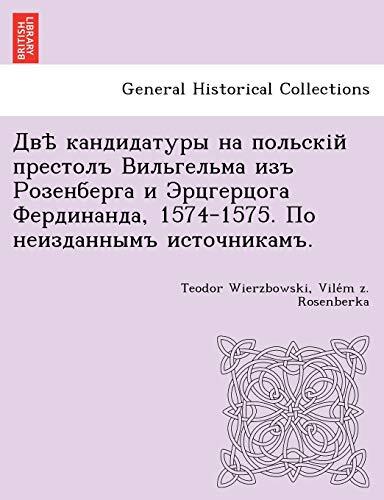
Двѣ кандидатуры на польскій престолъ Вильгельма изъ Розенберга и Эрцгерцога Фердинанда, 1574-1575. По неизданнымъ источникамъ.
بواسطة
Teodor Wierzbowski
لا توجد تقييمات بعد
Science & Technology
History
Business & Economics
+1
more
تنسيق
غلاف ورقي
صفحات
590
لغة
الروسية
منشور
Jul 11, 2012
الناشر
British Library, Historical Print Editions
رقم ISBN-10
124902188X
رقم ISBN-13
9781249021889
الوصف
Amidst the political intrigue of 16th-century Europe, this work delves into the candidacies for the Polish throne presented by Wilhelm of Rosenberg and Archduke Ferdinand during the tumultuous years of 1574-1575. The author, Teodor Wierzbowski, carefully navigates a wealth of unpublished sources that illuminate the complex dynamics of power, ambition, and regional alliances.
Through detailed analysis, Wierzbowski sheds light on the motivations behind both candidates' claims, revealing the intricate web of familial ties and political maneuvering that defined the era. The narrative not only captures the historical landscape but also invites readers to ponder the implications of such struggles on the broader European stage.
Wierzbowski's meticulous research offers a fresh perspective on a pivotal moment in Polish history, showcasing the intersection of culture and politics that influenced the region's destiny. This examination serves as both a scholarly resource and an engaging account for those interested in the intricacies of monarchical competition and the quest for influence.
Ultimately, this exploration contributes to a deeper understanding of the historical forces that shaped Poland, providing insight into the very foundations of its governance and society during a critical period.
Through detailed analysis, Wierzbowski sheds light on the motivations behind both candidates' claims, revealing the intricate web of familial ties and political maneuvering that defined the era. The narrative not only captures the historical landscape but also invites readers to ponder the implications of such struggles on the broader European stage.
Wierzbowski's meticulous research offers a fresh perspective on a pivotal moment in Polish history, showcasing the intersection of culture and politics that influenced the region's destiny. This examination serves as both a scholarly resource and an engaging account for those interested in the intricacies of monarchical competition and the quest for influence.
Ultimately, this exploration contributes to a deeper understanding of the historical forces that shaped Poland, providing insight into the very foundations of its governance and society during a critical period.